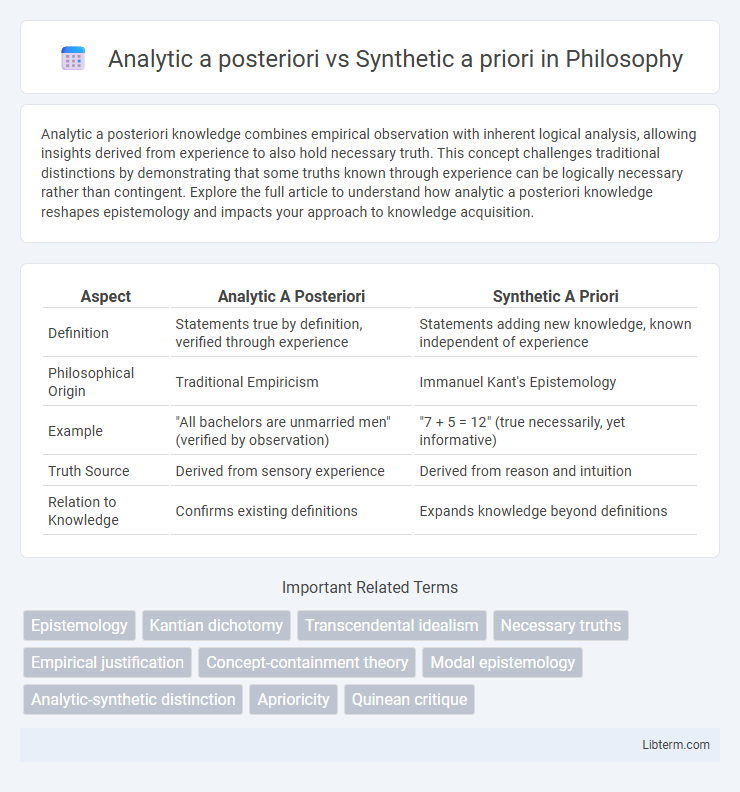Analytic a posteriori knowledge combines empirical observation with inherent logical analysis, allowing insights derived from experience to also hold necessary truth. This concept challenges traditional distinctions by demonstrating that some truths known through experience can be logically necessary rather than contingent. Explore the full article to understand how analytic a posteriori knowledge reshapes epistemology and impacts your approach to knowledge acquisition.
Table of Comparison
| Aspect | Analytic A Posteriori | Synthetic A Priori |
|---|---|---|
| Definition | Statements true by definition, verified through experience | Statements adding new knowledge, known independent of experience |
| Philosophical Origin | Traditional Empiricism | Immanuel Kant's Epistemology |
| Example | "All bachelors are unmarried men" (verified by observation) | "7 + 5 = 12" (true necessarily, yet informative) |
| Truth Source | Derived from sensory experience | Derived from reason and intuition |
| Relation to Knowledge | Confirms existing definitions | Expands knowledge beyond definitions |
Introduction to Epistemological Distinctions
Analytic a posteriori judgments are rare but involve statements whose truth is derived from experience yet hinges on the necessity of their concepts, contrasting with synthetic a priori judgments that expand knowledge by connecting concepts with empirical content independent of experience. Epistemologically, this distinction challenges traditional Kantian categories, prompting deeper analysis of how knowledge can be both necessarily true and yet informative about the world. Understanding these categories is crucial for exploring the foundations of knowledge, metaphysics, and the limits of human cognition.
Defining Analytic and Synthetic Judgments
Analytic judgments are those where the predicate concept is contained within the subject concept, making the statement true by definition and independent of experience. Synthetic judgments add information to the subject that is not inherently contained within it, requiring empirical evidence or experience for validation. The distinction between analytic and synthetic judgments is fundamental in epistemology for understanding how knowledge is structured and validated.
Understanding A Priori Knowledge
A priori knowledge is understood as knowledge justified independently of experience, often exemplified in analytic a priori judgments where predicates are contained within subjects, such as in mathematical truths. Synthetic a priori knowledge, contrastingly, involves judgments that extend our understanding beyond definitions yet remain necessarily true, like Kant's examples in metaphysics and natural science. Differentiating between analytic and synthetic a priori knowledge is crucial for comprehending how certain propositions are both informative and universally valid without empirical evidence.
Explaining A Posteriori Knowledge
A posteriori knowledge is derived from empirical observation and experience, making it contingent on sensory input and experimental evidence. This type of knowledge contrasts with synthetic a priori knowledge, which is independent of experience yet informative about the world. Analytic a posteriori knowledge, though less commonly discussed, typically involves analysis after empirical data collection, emphasizing the role of observation in establishing factual truths.
Analytic A Posteriori: Is It Possible?
Analytic a posteriori judgments challenge Kantian philosophy by proposing that some truths can be both inherently clear (analytic) and empirically derived (a posteriori). These judgments rely on empirical evidence while maintaining definitional necessity, blurring the strict Kantian division between analytic a priori and synthetic a posteriori knowledge. The debate centers on whether knowledge can be simultaneously grounded in experience and tautologically true, a question that remains controversial in epistemology.
The Concept of Synthetic A Priori Propositions
Synthetic a priori propositions extend knowledge by connecting concepts in a way that is not derived solely from experience yet is necessarily true, such as mathematical judgments and fundamental principles of natural science. These propositions are informative and universal, grounding knowledge that is both independent of empirical verification and not true by definition alone. Immanuel Kant famously asserted that synthetic a priori judgments form the basis of metaphysics, enabling objective understanding through innate cognitive structures rather than purely analytic deduction or empirical observation.
Kant’s Influence on the Debate
Kant's critique revolutionized the debate between analytic a posteriori and synthetic a priori judgments by introducing the synthetic a priori category, asserting that certain knowledge is both necessarily true and informative about the world, independent of experience. He argued that analytic judgments are tautological, merely unpacking concepts, while synthetic a priori judgments extend knowledge by connecting concepts with intuition, foundational for metaphysics and science. This framework redefined epistemology and influenced subsequent philosophers in assessing the source and scope of human understanding.
Examples of Analytic A Posteriori and Synthetic A Priori
Analytic a posteriori judgments are rare and typically involve definitions combined with empirical observation, such as "All bachelors at the party are male," discovered through experience of the event. Synthetic a priori judgments, famously exemplified by Kant, include statements like "7 + 5 = 12" and "Every event has a cause," which are necessarily true and informative yet known independently of specific experience. These examples highlight the epistemological distinction where analytic a posteriori depends on empirical verification of definitions, whereas synthetic a priori judgments provide foundational knowledge that shapes experience itself.
Philosophical Implications and Criticisms
Analytic a posteriori judgments challenge traditional Kantian categories by blending empirical observation with definitional truths, revealing complexities in the relationship between knowledge and experience. Synthetic a priori judgments, central to Kant's epistemology, assert foundational knowledge that is both informative and necessary, but face criticism for relying on intuitions that may lack objective verification. Philosophers debate these concepts' implications for epistemology, questioning whether knowledge can be truly independent of experience or purely definitional, impacting theories of cognition and metaphysics.
Contemporary Perspectives and Ongoing Debates
Contemporary perspectives on analytic a posteriori versus synthetic a priori judgments emphasize the evolving nature of Kantian epistemology, particularly how knowledge is categorized and validated through experience or inherent structures of the mind. Ongoing debates focus on whether synthetic a priori knowledge remains defensible given advances in cognitive science and logic, challenging the clear-cut division between analytic and synthetic truths. Recent scholarship also explores the implications of this distinction for fields like mathematics, philosophy of language, and metaphysics, highlighting the dynamic tension between empirical data and conceptual frameworks.
Analytic a posteriori Infographic

 libterm.com
libterm.com